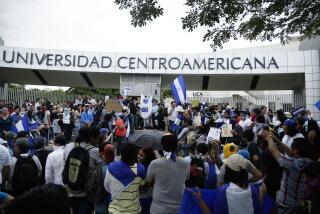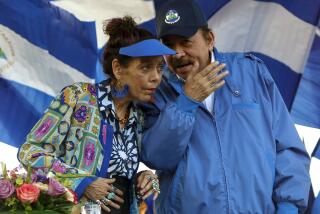Deeper and Dirtier
- Share via
The steady downward spiral toward a wider and bloodier war in Central America has begun, days after the House of Representatives approved President Reagan’s request for $100 million in aid for contra rebels fighting the government of Nicaragua.
In Managua the Sandinista army has begun acquiring dozens of new Soviet helicopters, and an increasingly defensive government has extended its crackdown on opposition groups from the newspaper La Prensa--which was closed down after the House voted for the contra aid--to the Roman Catholic Church. In Washington the Reagan Administration is struggling over who will control the President’s dirty little war now that congressional opposition to it has begun to collapse.
The Sandinistas’ move against the church was focused on two prominent churchmen, but that makes it no less ominous. Msgr. Bismarck Carballo, the official spokesman for Nicaragua’s Cardinal Miguel Obando y Bravo, and Bishop Pablo Antonio Vega, president of the country’s conference of bishops, were exiled from their homeland last week. Carballo was refused permission to reenter Nicaragua after a trip to Europe. Vega was ousted from Nicaragua after being escorted to the Honduran border by Sandinista police. Both of them were accused of aiding and abetting the contra war by constantly criticizing the Sandinista government.
Vega and Carballo were among the most highly visible critics of the Sandinistas in the Nicaraguan church. They made little effort to hide their contempt for the government, as Obando y Bravo does. But it strains credibility to imagine any way in which two priests could endanger Nicaraguan security, as the government claimed in moving against them. As in the case of La Prensa, the Sandinistas have instead shown that they are either unable or unwilling to tolerate the criticism that should be routine in a pluralistic political system, which is what they promised for Nicaragua during the revolution that defeated dictator Anastasio Somoza. The attacks on the church can only strengthen the hand of Reagan and others who seek to overthrow the Sandinistas.
However, Reagan is already finding that his Nicaraguan adventure will not be as quick and easy as he might have hoped. Last week Times correspondent Doyle McManus reported that a White House plan to have the Central Intelligence Agency oversee the contra war is meeting stiff resistance from the State Department. Even within the Administration, it seems, supporters of the contras doubt that they can be effectively controlled, and restrained from committing some of the excesses of which they have been guilty in the past, by the CIA--an agency whose whole modus operandi is secret.
This dilemma illustrates one of the fundamental problems posed by Reagan’s war in Central America: How is an open, democratic country supposed to run what is essentially a secretive, undemocratic campaign to overthrow a government with which it is officially at peace? There is no acceptable answer. The State Department, which is supposed to maintain good relations with other governments, cannot comfortably do it. The logical choice is the Defense Department, but in a revealing sign of how dubious U.S. military professionals are about the contras and their chances for victory, the Pentagon wants to have as little to do with them as possible.
So Reagan is in the embarrassing position of trying to find somebody, preferably somebody trustworthy, who can handle all the money that he wrested from Congress for his surrogate army in Central America. For lack of any other option, he will likely give control to the same CIA operatives who botched up the contra war when it was supposed to be covert. But that will not make his Nicaraguan campaign any more legal, moral or successful--just more secretive.
This is only the first of many embarrassments that Reagan and his aides should brace themselves for as the contra war intensifies. There will be more incidents of human-rights violations and questionable financial dealings by the contras. There will be claims of victory and progress by the contras that will be intended to prove how effective they are but that only their most ardent supporters will believe. There will be border incidents that could drag Nicaragua’s weak and frightened neighbors, Costa Rica and Honduras, into a regional war that nobody wants.
About the only good thing that can be said concerning Reagan’s contra conundrum is that it may raise new questions on Capitol Hill about his strategy in Central America. Contra aid must still be approved in the Senate before it actually begins to flow, and, although the Republican Party controls the upper house, we hope that enough senators have doubts about Reagan’s war to kill the $100-million contra appropriation. If not, the Senate should at least attach enough conditions to the aid so that Congress can call a halt to Reagan’s foolish adventure once the bloody futility of it becomes obvious.
More to Read
Sign up for Essential California
The most important California stories and recommendations in your inbox every morning.
You may occasionally receive promotional content from the Los Angeles Times.













